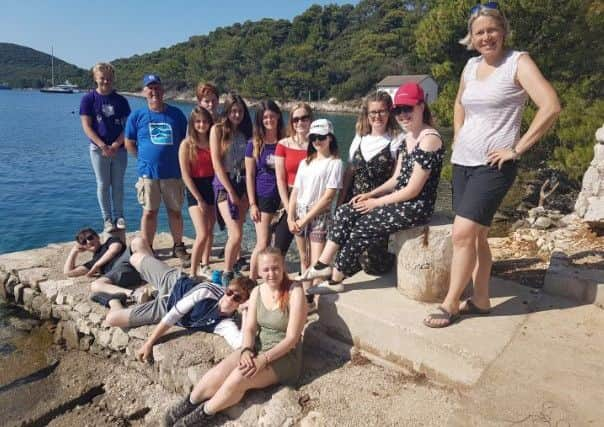Legless lizards, bats and all ...Croatia is the tops for Horncastle school


However, a group of students and staff from Horncastle’s Banovallum School spent part of their summer holidays in Croatia on an environmental expedition with Operation Wallacea.
The once-in-a-lifetime venture was the culmination of months of hard work as students raised funds to cover the cost of the trip.
Advertisement
Hide AdAdvertisement
Hide AdThey organised a range of activities including a race night, chocolate bingo and a fashion show - all held and well supported at Banovallum.


The students highlighted their initiative and determination by securing Saturday jobs and sponsorship by writing to local trusts and companies.
Some even went further...putting their birthday money towards their trip!
They spent their first week inland in Krka National Park, about two hours north of Split.
Advertisement
Hide AdAdvertisement
Hide AdThe area is famous for the large scale presence of Karsk limestone, which creates a unique environment.


The students were working with scientists, collecting data about the distribution and number of animals.
They were particularly interested to find out the number of different species that are endemic to the area, having adapted to the specific conditions and only found in this region of the world.
The data collected was focused on different animals.
The local bat population were investigated with students using an ‘echo location’ device to record the bats’ calls to work out which species they could hear.
Advertisement
Hide AdAdvertisement
Hide AdThey also helped set up mist-nets that catch the bats unharmed as they leave their caves. This allowed information about the sex, weight and age of bats to be collected.
Other investigations that the students participated in included examining the ‘native’ reptile population - not only snakes and lizards but also tortoises.
Many of the reptiles are nocturnal, so the students too part in evening walks.
At least, it was cooler but it involved some long days - and nights.
Advertisement
Hide AdAdvertisement
Hide AdThe expedition is an ongoing study that Operation Wallacea are running to see the impact of climate change on the distribution and number of reptiles in the national park.
It was a real ‘hands on’ experience for many of the Banvallum students, like Ami Johnson who got to hold a legless lizard.
One of the features of Krka National Park is a fascinating water system running through it,
The water has reacted with the limestone to create fascinating cave systems, as well as amazing waterfalls and rivers.
Advertisement
Hide AdAdvertisement
Hide AdOver the years, invasive fish species have been introduced and are now having detrimental effects on the endemic fish
The students learned that some species of fish are only found in one 8km stretch of a particular river - and nowhere else in the park or in the world.
The students helped with a survey to collect and count the percentage of the invasive species.
They also explored different methods to reduce their numbers - designed to help the endemic species to recover.
Advertisement
Hide AdAdvertisement
Hide AdAfter a week in the mountainous region of Croatia, the group moved to the marine section of the expedition, located on Mljet Island in southern Croatia.
Here, most of the students completed their scuba diving (PADI) open water qualification.
Some of them worked with several marine biologists collecting data through snorkelling, looking at how anchor damage is leading to a destruction of the seagrass beds which results in less areas for young fish to grow.
They also examined the distribution and different species of sea urchins.
Advertisement
Hide AdAdvertisement
Hide AdThree of the group, who had previously qualified as scuba divers, worked with marine biologists measuring a population of the Pinna Nobilis (noble pen shell) in a seawater lake, unique to Mljet Island.
Overall, it was a fantastic opportunity to work closely with scientists and collect data that will be used in scientific papers that will be published in the future.
It wasn’t all hard work. There was some time for sight-seeing with the students enjoying Croatia’s endless list of attractions .
The students were praised for their commitment and behaviour.
Hopefully, they might just have helped preserve Croatia’s unique ecology system - Sir David Attenborough would be proud of them!